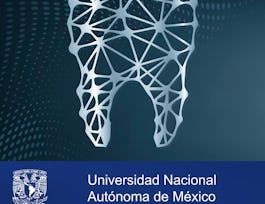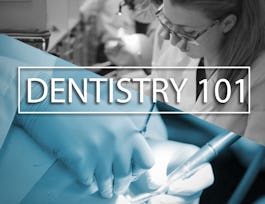The drive for development of new and novel oral biomaterials has never been more important with many people using oral biomaterials today and seeing their benefits in restoring and improving their oral health for a more enjoyable lifestyle. The unique properties of biomaterials such as titanium (Ti), zirconia (ZrO2) and various polymeric materials have made them materials of choice in oral health: dental implants, oral and maxillofacial surgery, and even regenerative medicine. Oral biomaterials research today is an exciting and intensive multidisciplinary area that encompasses contributions from a wide range of fields from professional dentistry to biology, chemistry, physics, material science, and engineering.


Materials in Oral Health
Taught in English
Some content may not be translated
21,476 already enrolled
(410 reviews)
Details to know

Add to your LinkedIn profile
11 quizzes
See how employees at top companies are mastering in-demand skills


Earn a career certificate
Add this credential to your LinkedIn profile, resume, or CV
Share it on social media and in your performance review

There are 4 modules in this course
What's included
15 videos8 readings3 quizzes1 peer review4 discussion prompts
What's included
15 videos3 readings3 quizzes3 discussion prompts
What's included
14 videos3 readings3 quizzes1 discussion prompt
What's included
9 videos4 readings2 quizzes1 peer review1 discussion prompt
Instructors

Offered by
Recommended if you're interested in Basic Science

Johns Hopkins University

The University of Hong Kong

Universidad Nacional Autónoma de México

University of Michigan
Why people choose Coursera for their career




Learner reviews
Showing 3 of 410
410 reviews
- 5 stars
74.75%
- 4 stars
19.41%
- 3 stars
3.39%
- 2 stars
0.97%
- 1 star
1.45%
New to Basic Science? Start here.

Open new doors with Coursera Plus
Unlimited access to 7,000+ world-class courses, hands-on projects, and job-ready certificate programs - all included in your subscription
Advance your career with an online degree
Earn a degree from world-class universities - 100% online
Join over 3,400 global companies that choose Coursera for Business
Upskill your employees to excel in the digital economy
Frequently asked questions
The major aim of the course is to help the students:
LEARN about important biomaterials used in oral health and their unique properties and use, UNDERSTAND the selection and clinical implications and potentials of biomaterials and technology used in dentistry, and APPLY the related knowledge, experience, challenges, and expertise in studies and research in oral biomaterials and CREATE SYNERGY in ever growing needs and contribution to tomorrow’s dentistry.
The MOOC includes 4 modules and runs over a period of 4 weeks.
You can refer to the Learning objectives page.
Week 1 reveals the unique properties and clinical implications of the much sort-after titanium and various ceramics and discusses the importance of surface treatments and modifications.
Week 2 discusses the characteristics of modern resin composites, other polymeric materials, and dental cements, looking into adhesion strength and the role of dentin bonding agents.
Week 3 explores present day and future dentistry: the increasingly popular role of digital dentistry in practice today, including CAD/CAM, crown fabrication, 3D printing and orthodontics.
Week 4 shows major research laboratory tests for testing specific mechanical properties, adhesion strength, as well as, spectroscopic techniques used in the analysis and charaacterization of biomaterials.
Each Weekly Module is divided into 3 to 4 Lessons, depending on the content area and topics. Each Module includes Learning Objectives, Further Reading materials for the week and Discussion Prompt questions in the discussion forum.
Each individual Lesson in the Weekly Module contains 3 to 4 video lecture videos and an automated assessment of Multiple Choice questions for knowledge consolidation.



